52 Interesting & Safe Human Foods Dogs Can Eat
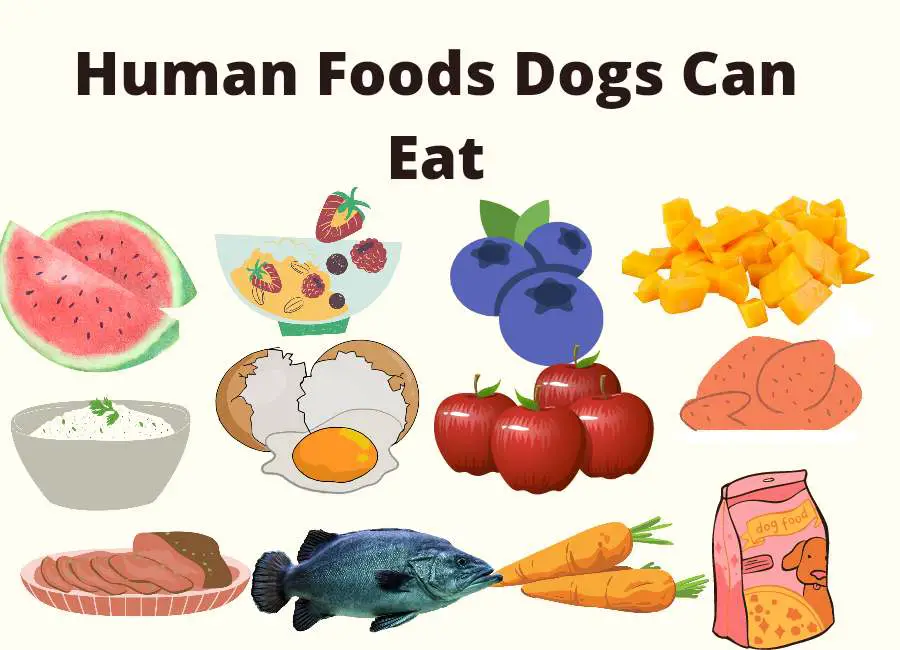
Hey there, dog lovers! We all know that our furry friends can’t resist giving us those puppy eyes whenever we’re enjoying a delicious meal.
But did you know that there are some human foods that are safe and healthy for our four-legged buddies?
In this blog post, we’re going to spill the beans on the top human foods that dogs can eat, so you can treat your pup while keeping their wagging tails healthy and happy! So, let’s dig in and discover some dog-approved goodies!
Human Foods Dogs Can Eat
Dogs can safely eat a variety of human foods, including lean meats, fruits, and vegetables, as long as they are prepared and served in a dog-friendly manner.
However, certain foods like chocolate, onions, and grapes should be avoided as these foods can be toxic to dogs.
Let’s dive deeper…
Fruits and Vegetable Dogs Can Eat
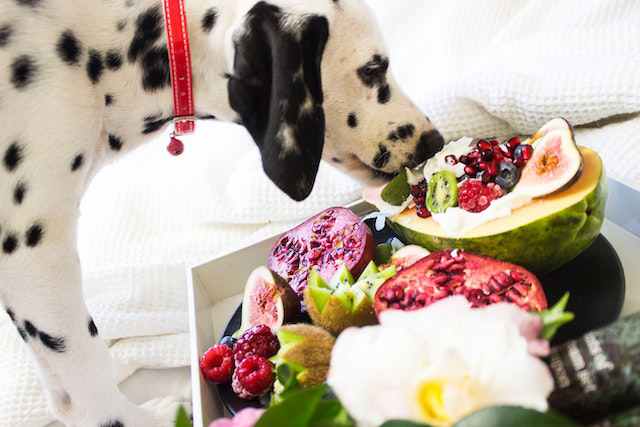
The following are some human fruits and vegetables dogs can eat:
1. Apples (without the core)
Apples are a safe and nutritious human food that dogs can enjoy. They are a great source of vitamins A, C, and fiber, which can support a dog’s immune system and promote healthy digestion. To feed apples to your dog, make sure to remove the core and seeds, as these can be harmful.
Cut the apple into small, bite-sized pieces and offer it as a treat or mix it with your dog’s regular food for added flavor and nutrients. Remember to introduce new foods gradually.
2. Watermelon (without the seeds)
Watermelon, without the seeds, is a safe and healthy fruit that dogs can enjoy. It is a great source of hydration for dogs due to its high water content. Additionally, watermelon is packed with essential vitamins such as vitamin A and vitamin C, which support a dog’s immune system.
To feed watermelon to your dog, remove the seeds and rind, and cut the fruit into small, bite-sized pieces. Offer it as a refreshing treat or mix it with your dog’s regular food for added flavor and nutrition. Remember to feed in moderation, as excessive consumption may cause digestive issues.
3. Cantaloupe (without the seeds)
Cantaloupe is a safe and healthy human food that dogs can enjoy. It is packed with essential vitamins and minerals, such as vitamins A and C, which can support immune health and promote healthy skin and coat.
To feed cantaloupe to your dog, remove the seeds and rind, as they can be a choking hazard. Cut the fruit into small, bite-sized pieces and offer it to your dog as a tasty and refreshing treat in moderation. Remember to introduce new foods slowly and monitor your dog for any signs of digestive upset.
4. Blueberries
Blueberries are a safe and nutritious human food that dogs can enjoy. They are packed with antioxidants, vitamins, and fiber, making them beneficial for a dog’s overall health. To feed blueberries to your dog, simply wash them thoroughly and remove any stems or leaves.
You can offer them as a treat or mix them into your dog’s regular food in small quantities to avoid digestive issues. Always remember to introduce new foods gradually and consult with your vet if you have any concerns.
5. Carrots
Carrots are a nutritious human food that can also be beneficial for dogs. They are low in calories and high in fiber, making them a healthy snack option. Carrots are rich in vitamins A, K, and C, which support eye health, immune function, and collagen production.
To feed carrots to dogs, they should be washed, peeled, and cut into bite-sized pieces. It’s important to introduce carrots gradually into a dog’s diet to avoid digestive upset, and they can be served raw or cooked.
6. Bananas
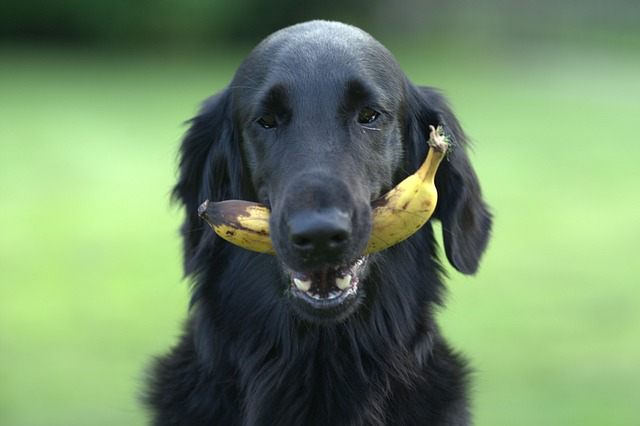
Bananas are one of the human foods that dogs can safely consume. They are nutritious fruit that can provide several benefits to dogs. Bananas are rich in essential vitamins and minerals, including potassium, vitamin C, and vitamin B6.
To feed bananas to your dog, simply peel the fruit and cut it into small, bite-sized pieces. Offer the banana as an occasional treat or mix it with your dog’s regular food for added flavor and nutritional value. Remember to feed bananas in moderation, as too much can cause digestive issues due to their high sugar content.
7. Green beans
Green beans are a safe and nutritious human food that dogs can enjoy. They are low in calories and high in fiber, making them an excellent choice for dogs on a weight management plan. Green beans are packed with vitamins and minerals, including vitamins A, C, and K, as well as potassium and iron.
To feed green beans to your dog, simply steam or boil them until they are soft, and then let them cool before serving. You can offer green beans as a healthy snack or mix them with your dog’s regular food for added nutrition.
8. Mango
Mango is a safe and healthy human food that dogs can enjoy. It is rich in vitamins A, C, and E, as well as dietary fiber, which can support a dog’s immune system and promote healthy digestion. To feed mango to your dog, ensure that the fruit is ripe and remove the pit, skin, and any other potential choking hazards.
Cut the mango into small, bite-sized pieces and offer it as a treat or mix it into your dog’s regular food in moderation to avoid digestive issues. Remember to introduce any new food gradually and monitor your dog for any adverse reactions.
9. Peas
Peas are nutritious human food that can be safely consumed by dogs. They are rich in vitamins, minerals, and fiber, making them a healthy addition to a dog’s diet. Peas provide essential nutrients such as vitamin K, vitamin C, and manganese, which support a dog’s overall health and immune system.
When feeding peas to dogs, it is important to cook them thoroughly and serve them in small, bite-sized portions to prevent choking hazards. Incorporating peas into a balanced diet can provide dogs with added nutritional benefits and a tasty treat option.
10. Cucumbers
Cucumbers are a safe and healthy human food that dogs can enjoy. They offer several benefits, including being low in calories and high in hydration, making them a great option for dogs trying to maintain a healthy weight. To feed cucumbers to your dog, it’s essential to wash them thoroughly and remove the seeds if necessary.
Cut them into small, bite-sized pieces and offer them as a refreshing treat or mix them into your dog’s regular meals for added crunch and nutrition. Remember to introduce cucumbers gradually and in moderation to avoid any digestive issues.
11. Spinach
Spinach is a human food that is safe for dogs to eat in moderation. It is packed with nutrients such as vitamins A, C, and K, as well as iron and fiber, which are beneficial for a dog’s overall health.
To feed spinach to your dog, it is important to cook it thoroughly to break down the oxalic acid, which can be harmful in large quantities. Serve it in small portions, mixed with your dog’s regular food, to avoid any digestive issues.
12. Pumpkin
Pumpkin is a safe and nutritious human food that dogs can enjoy. It is low in calories and high in fiber, making it beneficial for digestive health in dogs.
Feeding pumpkin to dogs can help regulate their bowel movements and alleviate constipation or diarrhea. To feed pumpkin to your dog, simply mix a spoonful of plain, canned pumpkin (not pie filling) into their regular food or serve it as a standalone treat.
13. Pineapple
Pineapple is a safe and healthy human food that dogs can enjoy in moderation. It is packed with essential nutrients like vitamin C, manganese, and dietary fiber, which can support their overall well-being.
When feeding pineapple to dogs, it is crucial to remove the tough skin and the core, as they can be difficult for dogs to digest. Serve the pineapple in small, bite-sized pieces as a tasty treat or mix it with their regular food as a nutritious addition. Remember to always introduce new foods gradually and monitor your dog’s reaction to ensure they tolerate pineapple well.
14. Broccoli (cooked)
Broccoli, when cooked, can be a healthy addition to a dog’s diet. It is packed with essential vitamins and minerals like vitamin C, vitamin K, and fiber, which can support a dog’s overall health. To feed broccoli to dogs, it is important to cook it thoroughly to aid in digestion and prevent any potential choking hazards.
It is recommended to serve small, bite-sized pieces of cooked broccoli as an occasional treat or as part of a balanced meal, ensuring it makes up no more than 10% of their daily caloric intake.
15. Strawberries
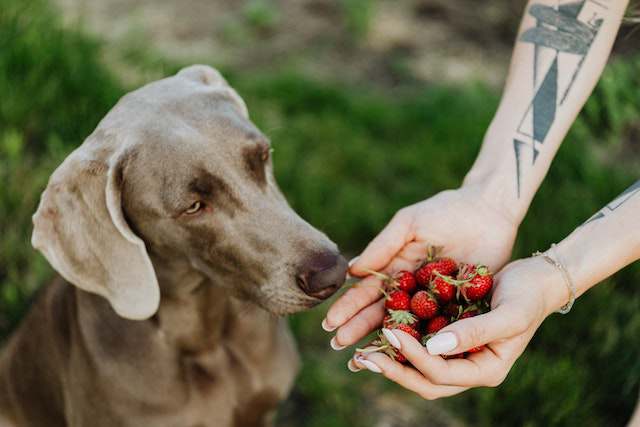
Strawberries are safe for dogs to eat and can provide various health benefits. They are a good source of vitamins, fiber, and antioxidants. When feeding strawberries to dogs, it’s important to remove the stems and leaves, as they can be hard to digest.
It’s recommended to slice strawberries into small, bite-sized pieces and feed them to your dog as an occasional treat or mix them into their regular meals for added nutrition. Remember to introduce new foods gradually and monitor your dog for any adverse reactions.
16. Raspberries
Raspberries can be a safe and healthy treat for dogs to enjoy. They are low in calories and packed with vitamins, minerals, and antioxidants, which can support a dog’s overall health.
To feed raspberries to your dog, start by washing them thoroughly to remove any pesticides or dirt. Then, offer a few raspberries as a snack or mix them into your dog’s regular food as a tasty addition. Remember to feed in moderation, as excessive consumption may cause digestive upset.
17. Blackberries
Blackberries are one of the human foods that dogs can safely enjoy. They are packed with essential nutrients such as vitamins A, C, and K, as well as fiber and antioxidants. Feeding blackberries to your dog can help support their immune system, promote healthy digestion, and improve their overall well-being.
To feed blackberries to your dog, simply wash them thoroughly and remove any stems or leaves. Serve them as a treat or mix them into your dog’s regular food in moderation, as excessive consumption may lead to digestive upset.
18. Oranges
Oranges are a safe human food that dogs can eat in moderation. They are packed with vitamin C, which can boost the immune system and promote overall health in dogs.
When feeding oranges to your dog, make sure to remove the seeds and peel them, as they can be difficult to digest and may pose a choking hazard. It’s best to offer small, bite-sized pieces of orange as an occasional treat, rather than as a regular part of their diet.
19. Tangerines
Tangerines are a safe human food that dogs can eat in moderation. They are a great source of essential vitamins like vitamin C, which can boost the immune system and promote overall health in dogs. To feed tangerines to your dog, peel the fruit and remove any seeds or piths, as they can be harmful.
Offer small slices or pieces as an occasional treat, making sure to monitor your dog for any digestive issues. Remember, while tangerines can be a healthy addition to your dog’s diet, they should never replace their regular, balanced meals.
20. Kiwis
Kiwis are safe and beneficial for dogs to eat in moderation. They are a great source of vitamin C, fiber, and antioxidants, which can support a dog’s immune system and promote overall health. To feed a kiwi to your dog, peel the fruit and remove the seeds, as they can be a choking hazard.
Cut the kiwi into small, bite-sized pieces and offer it as a treat or mix it into your dog’s regular food. Remember to introduce any new food slowly and monitor your dog for any adverse reactions.
21. Peaches
Peaches are a safe and healthy human food that dogs can enjoy. They are packed with essential vitamins and minerals, such as vitamin A and potassium, which can support a dog’s overall health. However, it’s important to note that the pit and skin of peaches should be removed, as they can be choking hazards and may contain harmful substances.
To feed peaches to your dog, simply slice them into small, bite-sized pieces and offer them as an occasional treat or mix them into your dog’s regular food in moderation.
22. Pears
Pears are a safe and nutritious human food that dogs can enjoy. They are packed with vitamins A and C, as well as fiber, which can support a healthy digestive system.
To feed pears to your dog, make sure to remove the seeds and core, as these can be choking hazards. Cut the pear into small, bite-sized pieces, and offer it as a treat or mix it with your dog’s regular food.
23. Tomatoes
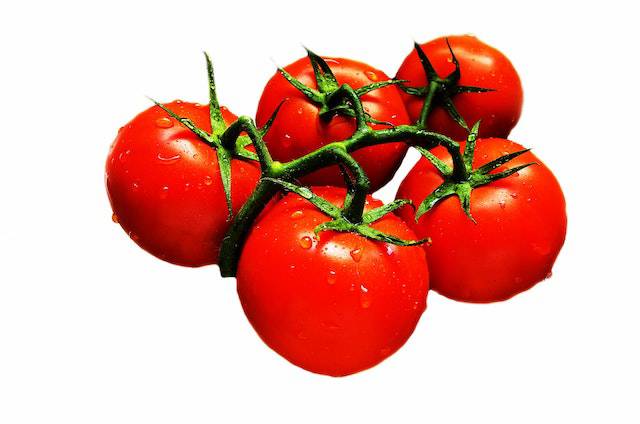
Tomatoes can be a safe and healthy addition to a dog’s diet when given in moderation. They are low in calories and a good source of vitamins A, C, and K, as well as potassium and fiber.
However, it’s important to note that the leaves and stems of the tomato plant contain solanine, which can be toxic to dogs. To feed tomatoes to your dog, remove the leaves and stems, and only offer ripe tomatoes in small, bite-sized pieces.
24. Kale
Kale is a nutritious leafy green vegetable that dogs can safely consume. It is packed with essential vitamins and minerals, including vitamins A, C, and K, as well as calcium and iron. To feed kale to your dog, ensure it is thoroughly washed and chopped into small, manageable pieces.
It can be served cooked or raw, but lightly steaming or sautéing it can make it easier for dogs to digest. Remember to introduce kale gradually into your dog’s diet and offer it as an occasional treat rather than a staple food.
25. Brussel Sprouts
Brussels sprouts are a safe and nutritious human food that dogs can enjoy. They are low in calories and packed with vitamins and minerals, making them a healthy addition to a dog’s diet. To feed Brussels sprouts to your furry friend, start by steaming or boiling them until they are soft.
Chop them into small, bite-sized pieces and mix them with your dog’s regular food. Remember to introduce new foods gradually and monitor your dog for any adverse reactions.
26. Zucchini
Zucchini is a safe and healthy human food that dogs can eat. It is low in calories and rich in essential nutrients such as vitamins A and C, potassium, and fiber. To feed zucchini to dogs, it should be washed and cut into small, bite-sized pieces.
It can be served raw or cooked, but it’s important to avoid seasoning or adding any ingredients that may be harmful to dogs. Zucchini can be a great addition to a dog’s diet as a healthy treat or mixed into their regular meals.
27. Corn
Cooked corn can be a safe and healthy addition to a dog’s diet. It is a good source of carbohydrates, fiber, and certain vitamins that can support their overall health.
When feeding cooked corn to dogs, it is important to remove the kernels from the cob to prevent any choking hazards. Serve corn in moderation as a treat or mix it with their regular dog food.
29. Coconut
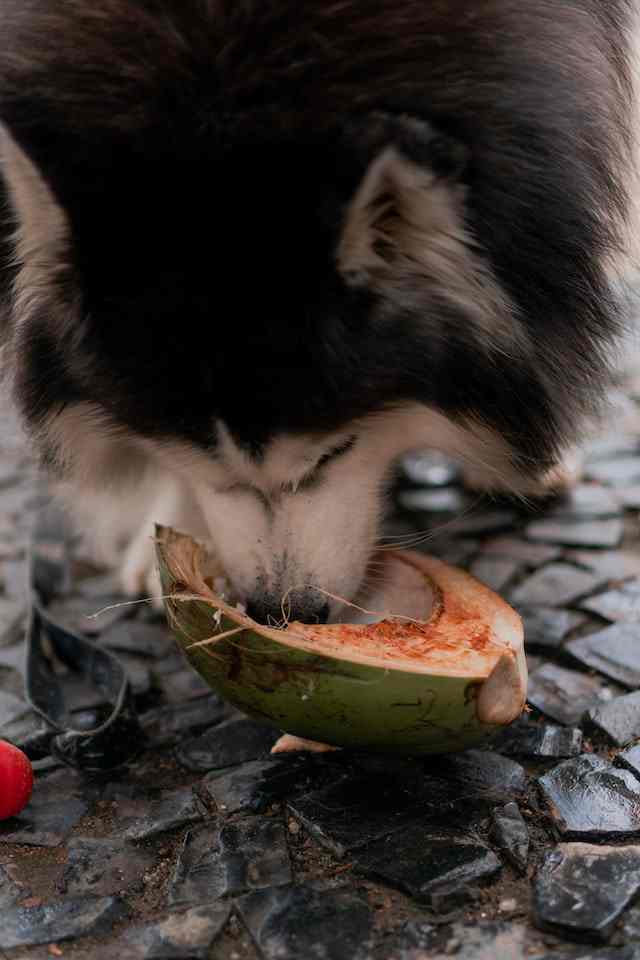
Coconut is a human food that dogs can safely consume. It offers several benefits, such as being a good source of healthy fats, vitamins, and minerals. To feed coconut to your dog, start by introducing small amounts and gradually increasing the portion size to avoid digestive issues.
You can offer coconut as a treat, or mix it into their regular meals. Remember to remove the tough outer husk and ensure that the coconut is free from additives like sugar or chocolate, which can be harmful to dogs.
30. Peanuts
Peanuts are one of the human foods that dogs can safely eat. They can be a healthy addition to their diet when given in moderation. Peanuts are a good source of protein, healthy fats, and vitamins, such as vitamin E and B vitamins.
To feed peanuts to your dog, make sure they are unsalted and not coated in any seasoning or additives. It’s best to give them peanuts in small amounts as a treat or mixed into their regular food to avoid overfeeding.
31. Cashews
Cashews can be a healthy and delicious treat for dogs when fed in moderation. They are a good source of protein, healthy fats, and essential minerals like magnesium and zinc. However, it’s important to note that cashews should only be given to dogs in small quantities as they are high in fat and can lead to weight gain or digestive issues if consumed in excess.
To feed cashews to dogs, it’s best to give them plain, unsalted cashews as seasoning or flavorings like salt or spices can be harmful to dogs.
Types of Meat Dogs Can Eat
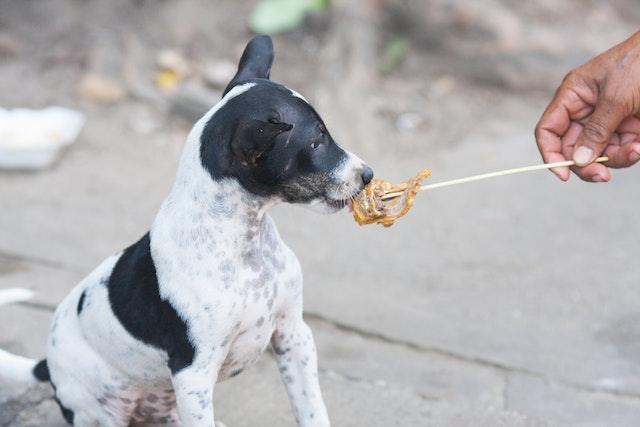
The following are some types of meat that are safe for dogs to eat:
1. Chicken
Chicken is considered one of the human foods that dogs can safely eat. It is a great source of lean protein, which helps in muscle development and repair. When feeding chicken to dogs, it is important to remove the skin and bones, as they can pose choking hazards or cause digestive issues.
Cooked chicken can be served plain or mixed with other dog-friendly ingredients, but it’s crucial to avoid seasoning or adding any spices, as they can be harmful to dogs.
2. Turkey
Turkey is a great human food that dogs can safely eat. It is a lean source of protein, low in fat, and provides essential amino acids for dogs. It is also rich in vitamins B6 and B12, niacin, and selenium.
To feed turkey to your dog, make sure it is plain, cooked, and boneless. Remove the skin and any excess fat, and cut it into small, bite-sized pieces. Serve it in moderation as an occasional treat or mix it with your dog’s regular food for added flavor and variety.
3. Beef
Beef is a safe and nutritious human food that dogs can enjoy. It is an excellent source of protein, essential amino acids, and various vitamins and minerals. When feeding beef to dogs, it’s important to ensure that it is cooked thoroughly to kill any potential bacteria or parasites.
It should be served in moderate portions, without any seasonings or additives that may be harmful to dogs. Introducing beef into a dog’s diet can provide them with a tasty and healthy alternative to their regular meals.
4. Pork
Pork can be a suitable human food for dogs when fed in moderation. It is a good source of protein, vitamins, and minerals, including vitamin B12, zinc, and iron. When feeding pork to dogs, it is important to ensure that it is cooked thoroughly to eliminate any potential bacteria or parasites.
Additionally, it is crucial to avoid seasoning the pork with any ingredients that are toxic to dogs, such as onions or garlic. Serving small, boneless pieces of cooked pork as an occasional treat or as part of a balanced diet can provide dogs with a tasty and nutritious alternative to their regular meals.
5. Salmon
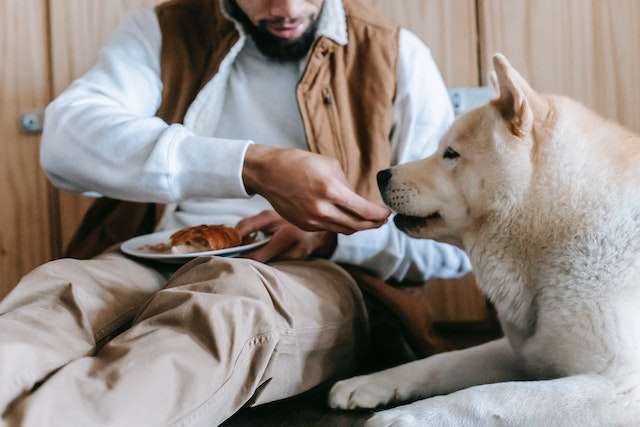
Salmon is a nutritious human food that can also be beneficial for dogs. It is an excellent source of omega-3 fatty acids, which promote a healthy coat and skin, reduce inflammation, and support brain development.
When feeding salmon to dogs, it is important to ensure it is cooked thoroughly to eliminate the risk of parasites and bacteria. Remove any bones, as they can pose a choking hazard, and serve it plain without any added seasonings or spices. Remember to feed salmon in moderation as part of a balanced diet for your furry friend.
6. Tuna
Tuna is a human food that dogs can eat in moderation. It is an excellent source of lean protein, omega-3 fatty acids, and essential nutrients like vitamin D and selenium. When feeding tuna to dogs, it is important to choose low-sodium options and avoid any seasonings or sauces that may be harmful to them.
Tuna can be served cooked or raw, but it is crucial to remove any bones and ensure that it is properly prepared to avoid the risk of parasites or bacterial contamination.
7. Rabbit
Rabbit is a safe and nutritious human food that dogs can eat. It is a lean source of protein, low in fat, and rich in essential amino acids. Feeding rabbit meat to dogs can promote muscle development and support a healthy coat.
To feed rabbit meat to your dog, ensure it is cooked thoroughly, without any seasoning or additives. Serve it in small, appropriate portions, and monitor your dog for any adverse reactions.
8. Duck
Duck is a nutritious human food that dogs can safely consume. It is a great source of protein, which helps in muscle development and overall growth. Additionally, duck is packed with essential vitamins and minerals that contribute to a healthy immune system.
When feeding your dog duck, it is important to ensure that it is cooked thoroughly to eliminate any harmful bacteria. Serve it in small, manageable portions and avoid seasoning or adding any spices that may be harmful to dogs.
9. Lamb
Lamb is nutritious human food that dogs can safely consume. It is a high-quality source of protein, essential amino acids, and vitamins such as B12 and zinc, which support overall canine health.
When feeding lamb to dogs, it is important to ensure that it is cooked thoroughly and free from any seasonings or additives that may be harmful to them. Serve lamb in small portions as an occasional treat or as a part of a balanced diet, taking into consideration your dog’s size, weight, and any dietary restrictions they may have.
10. Eggs
Eggs are nutritious human food that dogs can also enjoy. They are an excellent source of protein, vitamins, and minerals, which can support a dog’s overall health. To feed eggs to dogs, they should be cooked thoroughly to eliminate the risk of salmonella.
Simply scramble, boil, or poach the eggs, and then let them cool before serving them in small portions as an occasional treat or mixed with their regular dog food. It’s important to note that eggs should be served plain, without any seasoning or additives such as salt or butter.
11. Shrimp
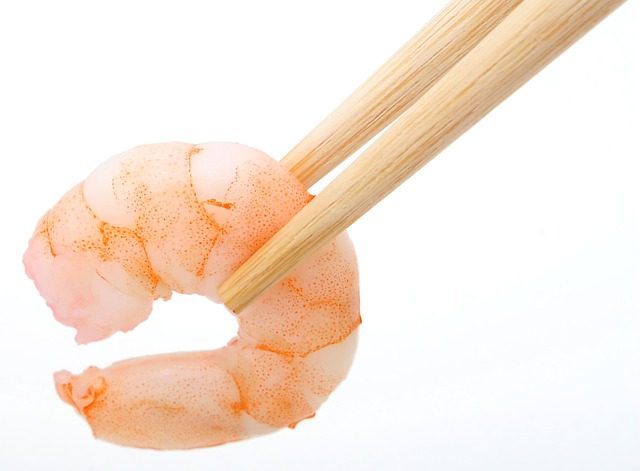
Shrimp can be a safe and nutritious human food for dogs when prepared properly. It is an excellent source of lean protein and contains essential nutrients like omega-3 fatty acids, vitamin B12, and selenium.
To feed shrimp to your dog, make sure it is cooked thoroughly without any seasonings or additives. Remove the shell and tail, chop it into small, bite-sized pieces, and serve in moderation as an occasional treat or mix with their regular dog food.
Other Human Foods Dogs Can Eat
The following are some other human foods dogs can eat:
1. Honey
Honey can be safely consumed by dogs as human food in moderation. It offers several benefits, including natural antioxidants that can boost the immune system and promote overall health.
When feeding honey to dogs, it is important to start with small amounts to avoid stomach upset and monitor for any allergic reactions. The recommended dosage is typically one teaspoon per 20 pounds of body weight, and it can be mixed with their regular food or given as a treat.
2. Quinoa
Quinoa is a nutritious grain that can be safely consumed by dogs. It is rich in protein, fiber, and essential minerals such as magnesium and iron. Feeding quinoa to dogs can provide them with a good source of energy and support their digestive health.
To feed quinoa to dogs, it should be cooked thoroughly and served in moderation as a part of their balanced diet. It is important to avoid adding any seasonings or spices that may be harmful to dogs.
3. Oatmeal
Oatmeal is a healthy human food that dogs can safely consume. It offers several benefits for dogs, including being a good source of fiber, vitamins, and minerals.
Feeding oatmeal to dogs should be done in moderation and cooked without any added sugars or flavorings. It is best to consult with a veterinarian to determine the appropriate portion size and frequency of feeding oatmeal to dogs to ensure it aligns with their specific dietary needs.
4. Plain Yogurt
Plain yogurt can be a healthy addition to a dog’s diet. It is a great source of calcium, protein, and probiotics, which can help improve digestion and boost the immune system.
When feeding plain yogurt to dogs, it is important to choose a variety that does not contain any added sugars or artificial sweeteners, as these can be harmful to dogs. It is recommended to start with small amounts and gradually increase the serving size while monitoring for any signs of digestive upset.
5. Brown Rice

Brown rice is a safe and nutritious human food that dogs can eat. It provides dogs with essential carbohydrates for energy, fiber for digestion, and some essential vitamins and minerals.
To feed brown rice to your dog, cook it thoroughly without any spices or additives. Mix it with your dog’s regular food or serve it as a standalone meal, making sure to monitor portion sizes according to your dog’s weight and dietary needs.
6. Bread (without raisins or other toxic ingredients)
Bread can be a safe and occasional treat for dogs, as long as it does not contain any toxic ingredients like raisins, garlic, or onions. It provides carbohydrates for energy and can be a source of fiber.
When feeding bread to dogs, it’s important to offer small pieces in moderation to prevent overconsumption and potential digestive issues. It’s also crucial to choose plain and low-sodium bread options without any added sugars or artificial additives.
7. Popcorn

Popcorn can be a safe and enjoyable human food for dogs when fed in moderation. It is important to note that plain, air-popped popcorn is the best option for dogs, as it eliminates the potential risks associated with butter, salt, or other seasonings.
Popcorn can provide dogs with a low-calorie and fiber-rich snack, promoting healthy digestion. To feed popcorn to dogs, ensure that it is plain, unsalted, and free from any additives or flavorings. Serve it in small, bite-sized pieces to prevent choking hazards.
8. Peanut butter
Peanut butter can be a safe and enjoyable treat for dogs when given in moderation. It contains healthy fats, protein, and vitamins that can contribute to a dog’s overall well-being.
When feeding peanut butter to dogs, it’s important to choose a brand that does not contain xylitol, as this sweetener can be toxic to dogs. It’s best to serve peanut butter in small amounts, either as a reward or mixed with other dog-friendly foods, and to monitor your dog for any signs of allergies or digestive issues.
9. Cooked Potatoes
Cooked potatoes can be a safe and nutritious addition to a dog’s diet. They are a good source of vitamins and minerals, including vitamin C and potassium.
When feeding cooked potatoes to dogs, it’s important to remove any seasoning or additives, as they can be harmful. It’s recommended to serve potatoes in small, bite-sized pieces or mashed to ensure easy digestion.
10. White rice
White rice can be a safe and nutritious human food for dogs when prepared properly. It is easily digestible and can be helpful for dogs with upset stomachs or diarrhea.
To feed white rice to your dog, cook it plain without any added seasonings or oils. Serve it in small portions mixed with your dog’s regular food, and consult with your veterinarian for specific feeding guidelines based on your dog’s size and health condition.
Conclusion
In conclusion, it’s important to remember that while dogs can enjoy some human foods, not all are safe for them to consume.
Before sharing your plate with your furry friend, make sure to do your research and consult with your veterinarian. By being mindful of what you feed your dog, you can ensure their health and happiness for years to come.
